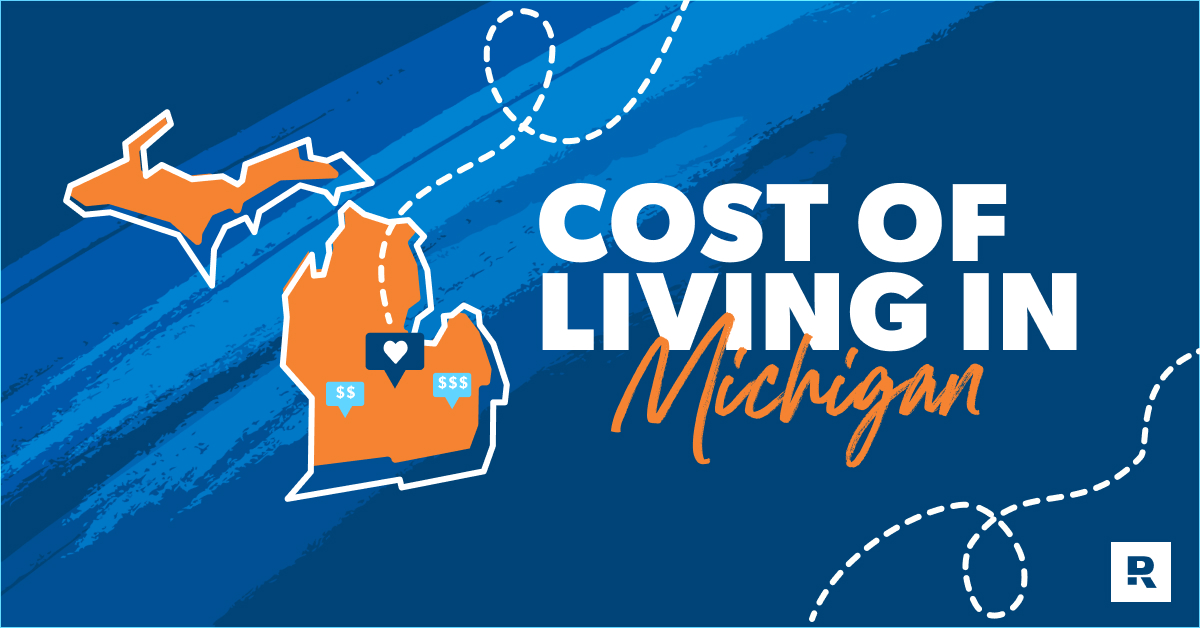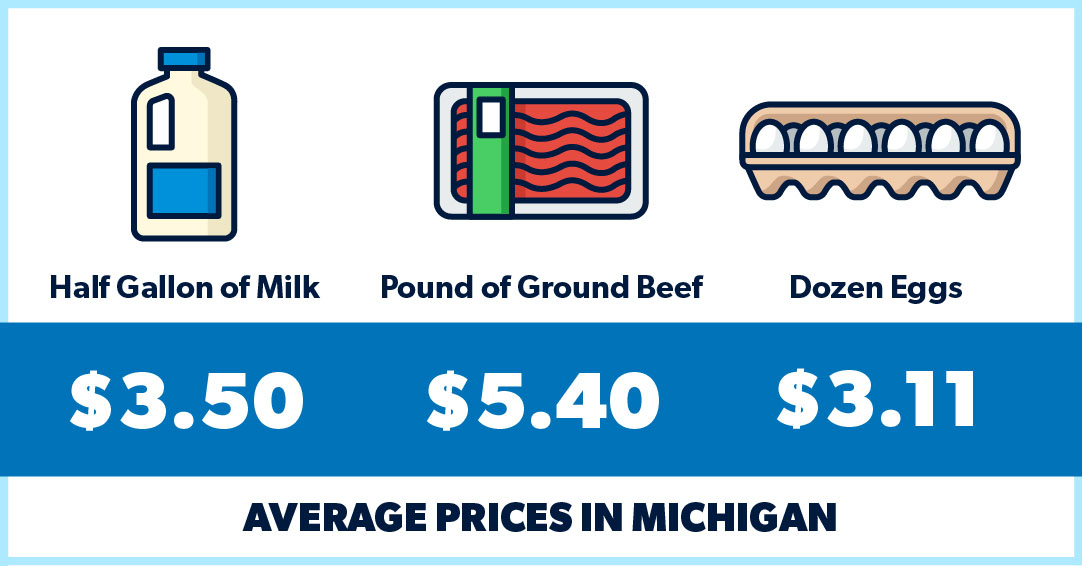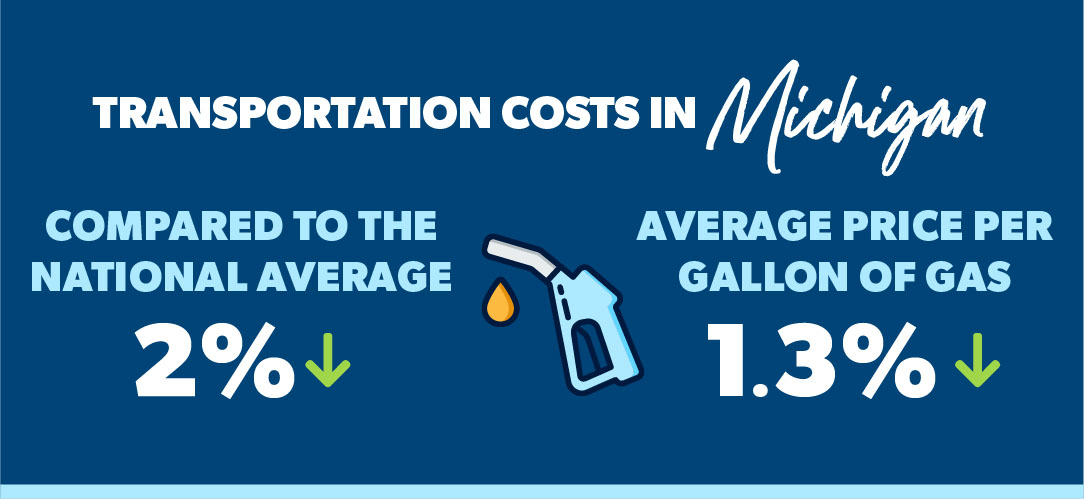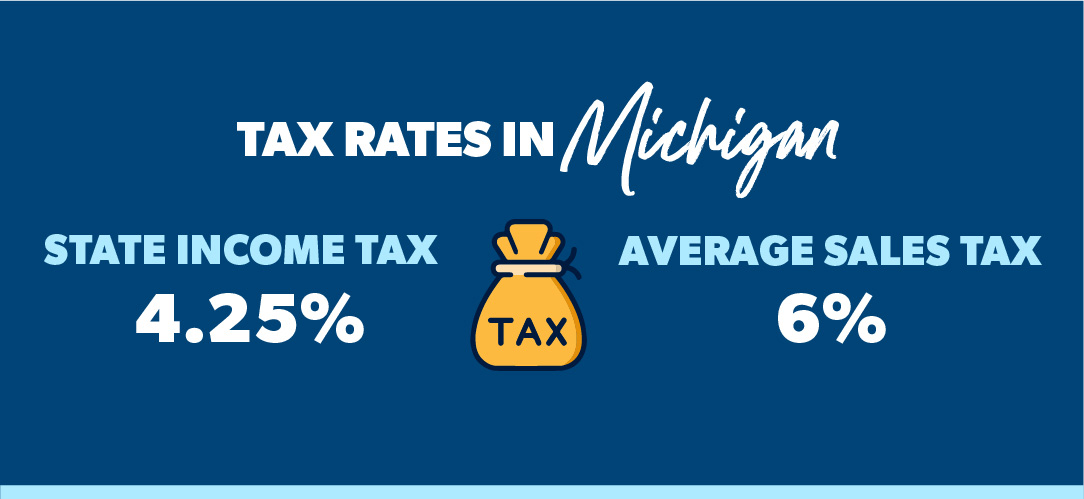
So, you’re thinking about buying some snow gear and moving to Michigan? Maybe you’re starting a new job, about to start school in Ann Arbor, or you just want to get closer to the Great Lakes and all the fun outdoor activities available up north.
But no matter why you’re considering a move to Michigan, you probably have one important question: Can I afford to live there?
To help you make a confident decision about whether to stay put or head up north, we’re going to break down the cost of living in Michigan and show you how much you can expect to pay for housing, groceries, transportation, health care and other common expenses in the Great Lakes State.
Let’s dive in!
What’s the Average Cost of Living in Michigan?
The cost of living in Michigan is 8% lower than the national average, making it a more affordable place to live than many other states. Just make sure you set some money aside to buy a nice winter coat. (Seriously, the winter temperatures in Michigan are no joke!)
Find expert agents to help you buy or sell a home.
Where did that number come from? We looked at the 2023 cost of living index from the Council for Community and Economic Research, which compares the cost of living in Michigan to the rest of the U.S.1 All the numbers in this article come from that index unless otherwise noted.
Cost of Living in Michigan by Major Cities
Wondering about the specific cost of living in Grand Rapids or any of the Michigan’s other more popular cities? Here’s a look:
|
Michigan City |
Cost of Living vs. National Average |
|
Grand Rapids |
3% lower |
|
Detroit |
3% higher |
|
Kalamazoo |
19% lower |
|
Benton Harbor |
12% lower |
Cost of Living in Michigan by Category of Expenses
Now, let’s break down the cost of living in Michigan by some of the most common categories of expenses you’ll need to budget for: groceries, housing, utilities, transportation, health care, and miscellaneous goods and services—things like clothing and trips to the movies.
|
Expense Category |
Cost vs. National Average |
|
Groceries |
3% lower |
|
Housing |
20% lower |
|
Utilities |
0.4% higher |
|
Transportation |
2% lower |
|
Health Care |
6% lower |
|
Misc. Goods and Services |
4% lower |
Cost of Housing in Michigan
The median home listing price in Michigan during fall of 2023 was $286,900, and the median rent for a two-bedroom apartment was $1,124.2,3 But it’s important to know that housing in some Michigan cities is less expensive than those numbers, and it’s much more expensive in other cities. So, the price you’ll pay for housing in Michigan will depend on which city you choose to live in.
To give you a good idea of the range, here’s a look at the specific costs to buy a home or rent an apartment in some of the biggest cities and best places to live in Michigan.
|
City |
Median Home Listing Price |
Median Rent |
|
Grand Rapids |
$399,0004 |
$1,6005 |
|
Detroit |
$262,0006 |
$1,2007 |
|
Kalamazoo |
$309,9908 |
$1,2009 |
|
Ann Arbor |
$495,19010 |
$2,25011 |
|
Lansing |
$244,00012 |
$1,00013 |
Other Costs to Keep in Mind
Housing isn’t the only thing you’ll have to pay for if you move to Michigan. Let’s dive into some of the other expenses you’ll need to keep in mind, including groceries, transportation, health care, taxes and other miscellaneous expenses.
Groceries
Groceries in Michigan cost 3% less than the national average. Curious about the cost of individual items that always wind up in your shopping cart? Well, we don’t have data for that Hershey bar you usually grab in the checkout line, but a typical half gallon of milk in Michigan will cost you $3.50, a pound of ground beef runs about $5.40, and the average price of a dozen eggs is $3.11.

Transportation
Wondering how much it’ll cost you to make your way to Tom Brady’s old stomping grounds at the University of Michigan, Detroit for a Lions game? Or maybe to a destination that doesn’t involve sports? Transportation costs in Michigan are 2% lower than the national average, and the average price for a gallon of gas is $3.75—a nickel less than the national average of $3.80.

Health Care
The only thing that stings more than that needle going in your arm during bloodwork is the bill you get afterward! But medical expenses are part of life. Here’s how much you can expect to pay in Michigan for medication or a visit to your primary care doctor, the dentist or an eye doctor.
|
Health Care Expense |
Average Michigan Cost |
National Average |
Difference |
|
General Doctor |
$111.12 |
$129.92 |
14% less |
|
Dentist |
$107.27 |
$111.85 |
4% less |
|
Eye Doctor |
$90.70 |
$121.80 |
26% less |
|
Advil |
$10.05 |
$10.48 |
4% less |
|
Prescription Drug |
$510.51 |
$464.38 |
10% more |
As you can see, a visit to a doc is pretty cheap in Michigan.
Taxes
How much of your paycheck will the government take if you live in Michigan? The state has a 4.25% flat income tax rate and a 6% state sales tax rate with no local sales tax. And keep in mind, some city governments in Michigan collect an additional local income tax.14

Miscellaneous Goods and Services
Lots of expenses don’t really fit into a major category, so let’s take a peek at a few of those here. In Michigan, ordering a pizza (hopefully it’s Detroit style) costs $10.37, getting a haircut runs $21.25, and buying a new dress shirt sets you back $27.03 on average.
Can You Afford to Live in Michigan?
At this point, you probably have one big question on your mind: Can I afford to live in Michigan? Well, it depends on your individual situation. Factors like your income, the size of your family, and which city you choose to live in will all have an impact on whether you can afford to live in Michigan.
The best way to get a good idea of whether you can afford the cost of living in Michigan is to use our free Cost of Living Calculator. It’ll let you plug in your current city and compare it with major cities in Michigan.
When it comes to knowing if you can afford housing in Michigan, remember the 25% rule: Whether you’re renting or you own a home, your monthly payment should be no more than 25% of your take-home pay. Anything more than that and you run the risk of overspending on housing and not having enough money left over for other important items in your budget.
You can use our free mortgage calculator to get a good idea of which home prices would fit within your budget.
Ready to Move to Michigan?
If you’ve pulled out that old graphing calculator you used in high school, crunched the numbers, and decided that moving to Michigan is the best decision for you and your family, that’s exciting! (Okay, maybe you don’t need an expensive calculator to figure that out.)
But before you pack up your daughter’s Barbie Dream House and hire someone to move your grand piano, you need to connect with a top-notch Michigan real estate agent if you’re planning to buy a home.
A real estate agent in Michigan with expertise on the local housing market can make the buying process a whole lot easier by coaching and guiding you from start to finish. And that’s a big deal, because let’s face it—moving to a new state isn’t easy.
Our network of RamseyTrusted real estate agents is full of great pros in Michigan. And they’ve all been vetted by our team to make sure they’ll serve you with excellence and prioritize your needs.
Connect with a RamseyTrusted agent today!
Next Steps
- Use our free Cost of Living Calculator to get a good idea of whether you can afford to live in Michigan.
- Figure out how much it’ll cost to move, and make a plan to save up that amount.
- Work with a RamseyTrusted real estate agent if you’re planning to buy a house.
Frequently Asked Questions
-
Where does Michigan rank in cost of living?
-
Michigan is one of the less expensive states to live in—its cost of living is 8% lower than the national average.
-
How much does it cost to live comfortably in Michigan?
-
The median household income in Michigan is $63,202.15 But the amount of money you’ll need to live comfortably in Michigan will depend on several factors, like which city you choose to live in, whether you rent or buy a home, and the size of your family.
-
What are utilities per month in Michigan?
-
The average monthly cost in Michigan for utilities is $250. That cost includes the typical monthly bills for electricity, water, internet service and natural gas.16
Did you find this article helpful? Share it!

We Hear You!
We’re considering adding the ability to save articles to your Ramsey account.



